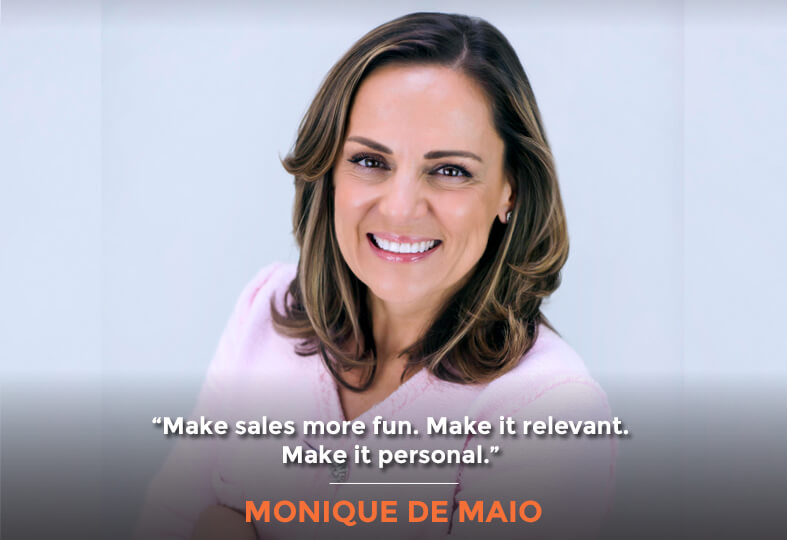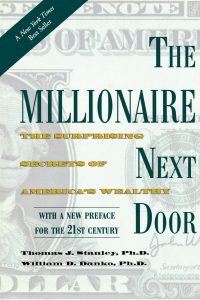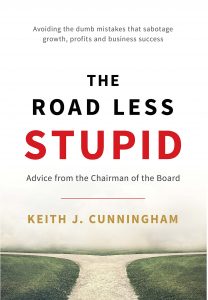Most businesses have a pitch that can be delivered succinctly inside the time it takes for a minute-long elevator ride. For B2B companies, pitching their business often requires a longer elevator ride. My guest today, Monique de Maio, Founder & CMO, ondemandCMO understands the nuances of all things B2B marketing. Founded 22 years ago, she considers ondemandCMO to be her third child. Over the years, her consultancy has evolved into something impressive, bringing the human touch to help clients solve every kind of marketing challenge.
In today’s episode, we talk about the ways in which Monique specializes in helping clients find their position, messaging, and voice—as she puts it, their DNA, to determine their competitive advantage. Monique discusses formative experiences starting out as a child immigrating to North America from Europe at five, what that perspective was like, getting herself into college and grad school. Monique weighs the value of getting an MBA today and what kind of merit that still holds in the business world. She’s an incredibly interesting and influential person with so much knowledge to share, so without any further ado, on with the show!

Transcript
Monique, it’s so great to have you on the show.
Thank you so much for having me. I’m really happy to be here.
So let’s talk about B2B because that’s something that I think doesn’t get enough attention in the marketing world. A lot of the discussion happens to be about B2C or just generally about marketing. But B2B is a bit different, right? There’s usually a longer buyer journey and can get a little more protracted. And you might want to use some specialized techniques like SPIN Selling, and so forth. So I’m curious what you see as the differentiating factors or the things that are very specific to B2B marketing that folks need to know about.
So I think you hit the nail on the head on a couple of things. One is when you are selling B2C, it’s a shorter sales cycle. It’s a lot more impulsive purchase. B2B, it’s a longer sales cycle, it’s more involved, there are more touchpoints, there is more vetting. So you have to kind of break it down for people. You have to be there for their research cycles, and you have to be there for their consideration cycles. It’s not going to be an impulse purchase. If you’re buying or selling tens of thousands of dollars of technology, technology services, or any such thing, that is how what do we call high involvement that really makes the sales process and the marketing process much more complex. And it has to be integrated, and it has to be thoughtful in its timing, and it also has to, more importantly, have to appeal to the person that’s ultimately buying it on a visceral personal and business level. So you have to kind of get them where they’re going to appreciate the value of using your product or service, from their perspective of their professional lives and their personal lives. Like, “Hey, if I buy this, or if I do this with this company, my job is secure. And I’m going to look like a hero.” So it’s a double down, right? So you have to look at it as the value play for both personal and professional. That’s how I see the differentiation.
Make sales more fun. Make it relevant. Make it personal. Share on XRight. And one thing that I think a lot of folks get wrong in the B2B world is they have too little personality or very kind of a cold presence to their company. And they don’t look human or personal to the marketplace because people buy from people; they don’t buy from faceless corporations.
That’s so funny that you brought that up, and I’m so glad you did. Because that was going to be my next point is that B2B brands, the ones that we often work with, and the technology companies and the fortune 100, and the fortune 10, and so on, they forget that they are selling to people. That’s exactly right. And a lot of the secondary and tertiary brands are afraid to go out there and structure and create a personality, a point of differentiation that doesn’t look, feel, walk, talk, act like everybody else. And that’s really where we try to get them to go. What makes you have a personality, have a differentiation? Like even the way you show up in your marketing has to be different, right?
For sure. And so what would be some of the differentiating ways that your clients have built rapport and relatedness and good feelings with their prospects?
One thing that I think a lot of folks get wrong in the B2B world is they have too little personality or very kind of a cold presence to their company.
So I think it’s making the complex simple. It’s sort of like you don’t want to talk down to people, right? You don’t want to insult their intelligence, but you want to make sure that they get that it’s not as complicated as some would make it out to be or it’s accessible to you. And here’s how you engage. So I think we do a lot of sales enablement work. So we make it very clear to the prospect and the customer that it’s not as complicated as they might think to do business with the company, to work with the company. And we have B2B clients that do a lot of channel marketing. So they’re competing in a space where they’re not the only brand that their customers sell.
For instance, you are selling through distributors or value-added resellers or all that kind of thing. So if you’re Intel, you’re going to have your competitors as AMD. Whatever the case may be is you’re going to have hardware software and peripheral and SaaS providers that are competing with you for the share of mind of that particular entity. So how do you differentiate if they’re selling the same stuff, right? Well, maybe it’s easy to engage, it’s easier to deploy, it’s easier to manage, maintain, blah, blah, blah, right? And then the way you look, feel, the way you show up the brand, the essence of the brand, and the identity has to be in alignment with that messaging. And that’s oftentimes where we kind of have that conversation with the client is, here’s what the rest of your ecosystem looks like, here’s where they’re all competing, almost like a Gartner Magic Quadrant with like, “whitespace”–we assess that. Where do you want to own that nobody else is playing? And that’s where you want to be.
And that’s referred to by some as “blue ocean,” right? So what would be an example where you are establishing yourself in a blue ocean, or a place where we’re nobody else is playing? Like for you as ondemandCMO?
Well, it’s funny you said that because I think a lot of agencies like to play in the branding and identity space, and they love the creation of the look and feel. And other companies like to be in that marketing automation space, and they like to be in the social media space. And where we’re playing is completely agnostic, which you can’t scale it. So that’s why people don’t like to play in that space. And honestly, sales enablement. So we narrow the gap between what happens once you establish your messaging positioning strategy to when you go out to the marketplace, great, and then, and then what? We are the “and then what?” people, right? So that’s where we differentiate our whitespaces. Not a lot of agencies are good at incentivizing the channel to buy from that customer, not a lot of agencies are good at creating that messaging that goes to the indirect channel partner—We do channel marketing well, goes to that indirect channel marketing partner, and says, “Why us over that guy?” Good sales enablement, it’s lead gen, it’s all that, nurture.

Gotcha. So do you have an example of a client success where you can walk us through that sales enablement process? And what you did to rock their world?
So, NaviSite is a great client example. NaviSite is a cloud services provider, and obviously, cloud service providers are, I wouldn’t say, a dime a dozen, but there’s a lot out there. And they came to us with a challenge in that they had too many leads, and they had tens of thousands of leads where the team that was responsible for following up on those leads was getting completely inundated. And they couldn’t keep up with that, and by the time they got to delete it was cold, if not dead. And they were also chasing poor leads. So we help them create, with syndicated content and primary content through their channels, a lead generation quiz profile. So it was like check-in and see what your cloud indexes. Like how savvy are you about the cloud? And it was a quick eight to ten quiz-like questions that allowed you to take this quiz. They found it on different websites, and it was an add-on, like industry newsletters and things like that. And on their website, you took this quiz, and you answered questions like what you had in the cloud, what you were afraid to move to the cloud, what your budget was, what your technology objectives were.
All of these things allowed NaviSite to get a real clear picture of what that prospect situation was. And we scored it. And then we gave it back to the user, the person taking the quiz, we gave them back a report that said, “Hey, Stephan, this is your quiz report score. This is what it means about you relative to your peer group. You’re great at your knowledge about the cloud, but maybe you’re missing some opportunities to do X, Y and Z.” So anyway, fast forward, what happened with these leads is they went into the hundreds, but the hundreds were perfectly qualified, ready to go fully explained opportunities, which we had then programmed into their Salesforce, so we did an integration. And so every day the right salesperson would have the right lead with all of the information that that person answered as a book report like “Hey, you got to call Joe and these are Joe’s concerns, and this is what Joe wants to do.” And now they’re having an intelligent conversation, their lead conversion rate went through the roof, they had six close leads within eight months, which represented five times what they paid for the program over the first six months, and it became the best lead gen campaign that they had ever done.
Oh, that’s fabulous.
Their lead conversion rate went through the roof. They had six closed leads within eight months, which represented five times what they paid for on the program.
Yeah, it was great.
So did the quiz takers know that they were going to get a call from a salesperson at NaviSite?
They had the option of not getting calls. So there was an opt-in opt-out, right? So not to be completely yucky about it, right? So you were interested in knowing more about how you could increase your cloud knowledge or meet your objectives, we gave them multiple-choice options to engage or not engage. If you wanted a free report, you got the free report. It was personalized and very in-depth. But we created it on an algorithmic basis, and if you had this score at this score, then there was a good prospect of this score, and that score, it was an excellent prospect. And if you had a score of x, y, and z, it was like a “call today” kind of thing, right? So that’s why they were able to jump on all these opportunities because you became smart about what the prospect was looking for and what they thought was the most compelling reason to engage. So another way you can take sales enablement, make it fun, make it relevant, and make it personal.
Awesome. Was it you who came up with the idea of the quiz?
Yes.
Very cool. I’m curious if you have any case examples for clients, or for yourself, where you’ve developed a referral program. Because many, many B2B companies rely on referrals from current or existing clients, customers, or the channel partners or different strategic alliances for a lot of their business?
Absolutely. Yeah. So it’s interesting that you say that, so our Fiserv practice, which is run by my partner, Steve Facini, he does a lot of that with COI, centers of influence and referrals for the financial industry market, Fiserv; financial services, and also fintech; financial services technology, where that’s really how they operate. They operate in these little clusters of decision-makers and influencers. So the CPA will refer to the financial person, the financial person will refer back, and it becomes this little these ecosystems of referral partners that work together. And they’ve come up with a series of educational seminars based on their prospects and the profile of the persona that they’re going after that these referral partners get together and do and co-op if you will. And that has been very successful for both their referring base and the stickiness of their current customer relationships. So that’s more on their side. Our technology partners’ education and not for profits are less about the referrals than our fintech.
Okay. So when you are reliant on referrals, or you want more, what does it mean to have a referral program? Is it a system? Is it a set of processes? Is it just as simple as having a checklist and following that checklist or just asking for the referral? Like how do you motivate clients to refer more business to you?
B2B is a longer sales cycle. It is a more involved arena where there has to be more room for multiple touchpoints and vetting. Share on XSo again, I don’t know that this is necessarily what I focus on in the B2B space with my particular verticals, as I mentioned, but for some of the other clients that we work with, I think it’s all of that. It’s making it simple. So Steve has baked the referral programmatic into the onboarding of his customers, and the cost of the clients’ customers, I should say, right? So that they understand the importance of cross-referral behavior. And I think that’s what it is. And so because in those regulated industries, they cannot necessarily receive compensation because it’s not allowed. They have to be very creative in what they do to create that synergy. So usually, they do it through education and programming.
Gotcha. Okay. So education and programming that would be like, maybe lunch and learns or something like that, where they can invite a colleague who might become a prospect.
Right, exactly. That’s just pretty much it. Yep.
Okay. So you mentioned nonprofit a little bit ago, do you work with a fair number of nonprofits?
Yes. So one of our non-profits is a school. So that’s a non-profit; schools check both boxes. But we’ve repositioned and rebranded multiple non for profits such as the Jewish Federation of Northern New Jersey, the Woman United in Philanthropy, the Bergen County’s United Way, United Way of Southern Florida. So that experience has also been very similar to the technology, and B2B examples we were talking about before, and these organizations are often stuck in the way of “I’m going to do it as everybody else does it.” And they have an opportunity to differentiate in a voice, in a tone, in an approach in the outreach that they do that allows them to attract their “peeps,” as I like to say.
Yeah. Let’s talk about that for a minute. Like that kind of traditional route for getting high-wealth, big donations from folks would be like gala type balls, big fundraisers, silent auctions, at the events, and so forth. That’s not happening now. If it is, it’s done virtually, which isn’t nearly as effective. So what are some outside the box ways for a nonprofit to get big donations that maybe you’ve even had a hand in to help your clients with?
That’s funny that you should say that because literally as we speak, we’re going to probably need to pivot on a live gala event. That’s funny. And that could happen. So let’s see, there’s been—gosh, you put me on the spot, no preparation here, let’s talk. So, in the case of, for instance, Bergen County’s United Way is a very different United Way. The United Way of Bergen County, which is a Northern New Jersey, really focuses on the development of housing for developmentally disabled populations, and those who have challenges where they want to live on their own, they want to live independently, but yet they need a community, if you will. So United Way, of course, as a component where the organizations that you work with could have an ongoing giving program that comes out of your paycheck, and blah, blah, blah, blah, and most United Way’s in the country are focused around if you will, those types of activities. The hunger, the education, the whatever.
The United Way focuses on the development of these communities of housing through construction. And the way that they get their support is by building with those partners, right? So they partner with developers, they partner with landowners, they partners with municipalities that are looking to house some of these populations, but they don’t have the wherewithal, the experience, the knowledge-base of what the executive director and the president of that organization understand so he comes with the plan, right? So, “Here’s the plan, here’s what we can do for your community, Mr. Mayor, Mr. Senator, Mr. Congressman, Mr. Fill in the blanks,” and then the money comes in that way. So that’s been a very creative and impactful way of leveraging both the community, the cause, and the populations and making that very happy marriage.

That’s very cool. Yeah. So that reminds me, I learned this from Brendon Burchard.
I love him. I have the High-Performance Academy.
That’s awesome. I went to that too, and Experts Academy. So he shares the story, you might have even heard it before where he partnered these nonprofits with these corporate sponsors, and then he was involved as well, because he wanted to sell bulk copies, like bulk amounts of his book. And the corporate sponsor would be financing that, and then the top donors of these non-profits would be providing the donor list like the top donor list would get a free copy of the book. Now the corporate sponsor didn’t get the list, but by funding this, they got brand impressions with these big donors. So you get a free copy of Brendan’s book with a cover letter saying thank you for your past donations. I appreciate it. This is just a thank you, we’re not trying to get more money from you, although it was very effective at getting more money. And he sold tons of books this way. It was clever. And so if you have a nonprofit that wants to do this and increase its donations, and you’ve got a suitable corporate sponsor, that’s not like, evil. And you’re willing to have their name on the cover letter that goes out. Yeah, it’s just a win-win all around.
That’s awesome. So now we have to think of a good book that makes sense for them, right? A good book or something like that that could be underwritten that way. That’s also strategically relevant. I think books are relevant to pretty much everybody.

Right. Yeah. And I think this was for his first book, Life’s Golden Ticket, that he did this, which it’s just a great story. It’s a feel-good story, and it’s about making a difference in the world and turning your life into something more magical and meaningful. I haven’t read the book, so I’m kind of reaching here. I have an idea of what the book is about, but I didn’t read it. Anyway. So it’s a cool strategy.
Thank you for that. You learn something new every day. That’s part of being in the business for so long. It’s funny you asked me a question. I’m thinking, okay, 22 years of doing it, what, we must have done this about 13 times, where it’s almost like a Rolodex of things that you can modify and kind of tweak as you go as the situations differ. And now with COVID, who’s to say, right? Well, we have to tweak.
Yeah, just always gonna be on your toes and think on your feet. So speaking of which, what will be some examples of, let’s say, research studies or things that could be considered even maybe analyst reports that you have done for clients that have gotten them a lot of business, something above and beyond just a typical white paper.
Yes, it’s funny that you say that because we do our fair share of white papers as well. It was more like, I think, one of the not-for-profit trade association’s membership-based. And what we did was, figure out what their members wanted that they weren’t delivering for them. And as a result of that, we created a thing called The University branded for them. And then we started to create content, and seminars and podcasts and webinars and conferences that went under this university brand that became like level one, level two, level three to serve all the constituents of the industry that they were trying to attract as members and then as a huge impact on their bottom line, and their stickiness their retention. So that was, I think, an example of creating something that was beyond just content. It was content, packaging, promotion, and it was all of it. And its brand extension, in essence, became almost as big as their core brand. So I was pleased with that.
It reminds me of an idea that I learned from I don’t remember who, but it was ages ago to have somebody that you rate highly, and respect even like a hero to have that person interview you about your topic. So, for example, I love Brian Tracy. I think he’s amazing. And imagine if Brian Tracy interviewed me about SEO, which is my topic. That would be pretty darn cool. And so if that’s the idea.
Wow, that’s a cool idea. I’d have to get Brendon Burchard to interview me, I guess.
There you go. Yeah, why not? Anything’s possible.
I know.
So now, let’s go back to the analyst idea. You mentioned earlier the Gartner Magic Quadrant. Are their analysts that you’ve been able to build relationships with almost like how PR professionals build relationships with journalists to get pieces in the newspapers and so forth? Have you been able to infiltrate that world of like Forrester and Gartner and all that?
Not really.
Me too.
That’s it. I feel much better now. No, I think that’s something that I feel much more comfortable having the client do because then it starts to confuse a little bit. So we were the second stop after they’ve got their relationship going, and they’re very protective of that. We are the recipients of the research and or the data that they just provided to the client. But ultimately, I don’t think it’s my role to kind of get into that mix at the moment.
Gotcha. Okay. So what do you find that’s different for SaaS, software as a service type clientele versus just regular B2B services companies? What is special or unique about SaaS marketing that our listeners should know about?
You need to do more work in making sure the message and the actual engagement process are in place.
Well, ultimately, I think, typically speaking, it’s a quicker purchase. The sales cycle might be a little shorter, depending on how complex the SaaS product or service is. But I think you need to do more work in making sure this simple message and the actual engagement process are in place. Because unfortunately, we’ve had multiple SaaS clients, where they’ve SaaS themselves—sorry to be funny, that’s almost a verb. But the way that they deploy and the way that they engage has still been stuck in the old way of the complexity of dealing with a huge organization that all of them that I’m going to think about are going to remain nameless for there. But they haven’t changed their processes. So it’s like dealing with the cable companies still, right? So if you want to be perceived as SaaS quick and easy to deploy an inexpensive purchase on the onset, and things like that, you don’t want your sales model to be complicated or overrun with bureaucracy. And that, I think, is what you need to be sensitive to before the client says, “I’d like to take this old-fashioned legacy service or product and turn it into a SaaS offering,” you really have to be clear with them that everything about the way they go to market is in alignment with that, and oftentimes it’s not.
Yeah, and what are your thoughts about the model of freemium? So you’ve got a free version, and then you’ve got a premium version, and then you’ve got the enterprise version, where it’s “call me, and we’ll talk, and we’ll figure out a really expensive price for you.” So what are your thoughts about that?
Well, I think again, it depends, again, on to this point, and that’s a really good example. I think the freemium could be a great loss leader in some regard. But ultimately, the problem within my mind, I don’t love freemium for B2B because I think it devalues what you ultimately want the end-user customer to buy for a price. If you get them used to dealing with, for example, like LastPass is a great example, I mean, not that they’re my clients. So I can talk about them, that’s precisely why I’m going to. They have a free version, which is pretty decent, but then they have a paid version. So how do you want that behavior to change, and you’re going to work hard to have them understand why they should pay $59 a year for that consumer version of the free thing that you think is protecting you just as well. But data shows that maybe you’re not being protected just as well. And the cyber experts will tell you, you’re not, but how does the average person know that. So on the enterprise or the B2B side, if I’m doing marketing on automation, and I’m an enterprise company, and you have given me a free version of that marketing automation as an example, then all of a sudden, you say it’s going to be a thousand dollars a month, I’m gonna be like, “What?” So I think the higher you’re trying to go on the B2B side in terms of the size of the company, the less I like freemium.
Yeah, I think it lowers the perceived value and gets a lot of tire-kickers and people who are low value.
I think it works in B2C, and if you have a cheap thing, that’s fine. It could be a loss later. But in B2B, you gotta be careful because then you’re just basically going out there saying it’s not worth anything if you’re willing to pay, great, but if you’re not, it’s not okay.
The beauty in implementing a referral program is that it lessens the opportunity to deal with cold leads. Your next client is someone who was referred to you by someone you've already dealt with directly. Share on XYeah. Let’s talk about selling on webinars and through just recorded videos and challenges and things like that in a B2B environment. Is this something that you can sell a high-ticket item, many thousands of dollars or tens of thousands of dollars through a webinar or a video series, or do you need to get people on the phone?
I think what you can do through channels like webinars and podcasts and things like that is you can have the target prospective client or customer understand the value of engaging with you. Ultimately, I do not think that you can ultimately sell on a webinar. You can sell perhaps on a demo because now we’re all in a virtual world. So can you make a sale virtually? Absolutely. Can you make a sale on a multi-thousand, tens of thousands, hundreds of thousands of dollar product through a webinar? No. What you can do, though, and in my estimation, and my experience, is have them understand that you’re the thought leader and the market leader in that subject in the industry. Therefore, ultimately, when they’re ready to buy, they should buy from you. But I don’t think the ultimate sale is going to go through that webinar.
Yeah, I agree with you. When you were talking, that reminded me of Jay Abraham‘s principle of preeminence, which is it’s in your best interest as well as the prospects to send them to the competitor if the competitor is a better fit.
Yes. Oh, yes, indeed. Can I just comment on that for a second?
Please do.

So obviously, we have this B2B positioning, and we’re clear about the fact that most of our business is B2B, and if we go B2C, it’s because it’s B2B to B2C, right? Okay. So with very little exception, and it was a referral. So it would sound kind of funny for a marketing agency to say this, but we don’t entertain new opportunities unless they come to us through a referral because it takes a lot of bandwidth and a lot of time and energy to respond to RFPs when it’s cold. And honestly, I don’t think somebody looking for an agency at the high-touch level is going to Google and come up with us and magically fall in love with us. So the reality is, almost somebody knows somebody that has worked directly with us or me, in any way, shape, or form. It’s just not going to be a fit. Having said that, there was a referral that came in just two weeks ago. And we had a meeting, and I knew that we were not the right fit for this client. And I was like, “You know what, here’s why. We are not the right fit for you. And I explained to them what they should do, what kind of agency they should seek out, and why and what to ask them for. And it was a great conversation. I’m sure we’ll stay friends.
Hey, you never know when those things come back to pay you dividends, even though you didn’t get any direct revenue at that time?
Well, it’s funny because that happened once we had a bank line. They brought us in to do a rebrand and a rename. And I said to the CEO, I said, “Listen, I’d love to take your money, but this is not the right time for you. And this is not the right answer based on what you’re telling me. You need to do a bunch of other things before you even bring us in.” And I walked away from a huge piece of business. And three months later, he called me back and said, “I’d like to put you on retainer because you’re one of the few people that told me the truth.” And they were a retained client for five years. So it was fun. I mean, they can do a rebrand and a rename, but not at that point.
Yeah. Awesome. So speaking of RFPs, and getting these in cold, and wasting a bunch of time, because they just have to hit several competitive bids to, like tick the box. But they already had their preferred provider before they even sent the RFP out. How do you recommend folks respond in those situations? What’re the most, not just effective but the most polite and appropriate ways to respond to these sorts of RFPs? I typically don’t respond to RFPs unless someone refers to me or it’s not a competitive situation, right?
Yeah. So you and I share the same approach. It’s like if you know us, and you’ve experienced that we do great work, and we’re going to do the right thing by you, then great. We’ll have a conversation. We have a few in terms of cold RFPs, but the RFPs that don’t come attached with a relationship or a knowledge base of prior work it’s not going to work because that’s like the three-bid contractor situation, right? They’re using you for your ideas and your pricing, and I think we got wise to that a bunch of years ago. And so we’re just like, “Thank you for the opportunity, but we do not respond to RFPs that have not been someone or some organization that we’ve done work with. Thank you.” That’s it. Likely, you’re not going to get it, so it doesn’t matter.
Yeah. And so, do you recommend that folks who are looking to hire an agency or a marketing firm put together an RFP, or is that kind of a waste of time?
I think it’s a waste of time. I think you’re better served speaking to your colleagues and your centers of influence and saying, “Look, these are my challenges. Who have you used in the past with those of you with similar challenges? Who have you found to be useful?” It has to be a personal connection, right? So if John uses Sue, and Sue uses Steve, and whatever, but there has to be some thread of success. Not all agencies are completely different from one to the other. Some have great strengths, some of the other strengths. And so somebody reached out and said. “Can you build a website for me?” I said, “No.” I mean, yes, of course, we do websites all day long. But we don’t do a website in a vacuum. I’m not a website agency. I’m an agency that helps you find your position, your messaging, your voice, your DNA, your competitive advantage, and then we build a website once we’ve gone through that whole exercise. You can’t possibly come to me and know exactly what you want to stay in a website off the bat without having done due diligence. Have you done the due diligence from a marketing SEO social perspective? Have you done all that? If you have, you probably should be continuing to work with the person that did that for you.
Marketing is not about networking. It's about solving business problems. Share on XRight. Now, you mentioned centers of influence. Is this a term that our listeners should know about? What do you think? Or is that something that maybe they’re not familiar with that term?
So if some people use centers of influence in their industry, so again, back to the professional services industries use centers of influence a lot. The technology services, people sometimes have that, and you can take centers of influence and chunk it out a little bit in different ways. Centers of influence could be my accountant, my lawyer, my doctor, my whatever, the people that are around you, or it could be, who is in my ecosystem, in my business, on and around my business that helps me with a referral, partners, with prospects with clients, and who do we kind of cross-refer. Like you and I can be in the same center of influence because we don’t lead with SEO, you’re an SEO expert. So if I had a client that was all about SEO, I would call you and say, “Hey, this is their entire focus. They want to do this kind of campaign.” So we could be cross-referring, and that’s our center of influence. We build people that we can go to for advice, for referrals, almost like a board of advisors beyond your own company. Does that make sense?
Yeah, I think so. I want to differentiate that from what some folks would know, as like these networking groups. BNI, for example, I think it stands for business, networking, international, something like that. And so there’s one lawyer, there’s one accountant, there’s one dentist, etc., in that group, and they refer business to each other. You probably wouldn’t consider that a center of influence, would you?
Not necessarily. I think that’s just it. Yeah, I think to your point, that’s just another channel for knowledge or referrals. But the center of influence is much more active in that you’re doing that on a day to day basis. Like I was part of Vistage for many years. And Vistage is awesome because it’s like this peer to peer advisory group. Even though you do have exclusivity within your category like I was the only marketing agency in my group. We were all businesses of a certain size, and you had to have a certain size and a certain sort of sales volume, etc. But we were each other’s confidants, board of advisors, sort of peer group. It wasn’t about networking, and it was about solving business problems. So we would come to the organization with, “This is my latest challenge. What do you guys think?” That could be a center of excellence.
And you would share maybe even financials and stuff you trust with that group?
Yes. Correct. Absolutely what you would share your marketing strategy and your marketing plans, your P&Ls and your staffing and your challenges in what you were facing at that particular moment in time. So it was we would get the opportunity to listen to keynote speakers, in addition, to use one another as sounding boards were quite effective.
Yeah, I was in. It wasn’t called Vistage. It was TEC.
That’s right.

Yeah. And this was many, many years ago. This was decades ago when I first started my first company back in the 90s. And I remember the chairman of our TEC group, and he gave everyone in the group they were having 12 of us a copy of the book, Millionaire Next Door.
Oh, my god. I love that book.
Yeah, that was such a pivotal moment in my early business career because I had never taken any business classes, let alone marketing classes. I just was learning from the school of hard knocks. I dropped out of a Ph.D. in biochemistry to start my agency. And so understanding that you don’t pimp your expenses–that’s a term from Keith Cunningham, who wrote The Road Less Stupid, which is another amazing book. But I thought that the person who has the fancy car and the Rolex and all that, that they had going on, and that was the signs of success, and then I read that book and like, wow. It’s the person driving the 15-year-old car, and who lives kind of a modest existence, who’s squirreling away all their money and reinvesting it and building an empire that is not visible to everybody, that’s true wealth.

Yeah, it’s funny. We have this conversation here at my house as well. And my husband I talked about, are you building the worth ethic, or are you building the wealth ethic? And that is a conversation that becomes difficult when you grow. Listen, I’m a zero generation immigrant. I came to this country at the age of five. I didn’t speak English, nor did my parents. So I’m very grateful for the opportunities that I was both given and was able to just seek out on my own because that would not have been the case in Europe. And so it’s a very, very interesting thing, having to go to work and making a living versus getting a job if you feel like it because mom and dad can pay the bills is a very different way of growing up.
Yeah. So how was it to immigrate at five-years-old to a completely different country and learn a different language and everything? Was it pretty easy, or was it discombobulating?
It was pretty discombobulating, and I’ll be honest. I learned how to speak English first. So I was the family interpreter for a couple of years until my parents kind of caught up and got the language. When I was growing up, they didn’t know what to do with me at school when I first got there because I didn’t speak and the kids were mean. I would say that the bullying conversation that we have today didn’t exist then, but it certainly was present in my life. And I would say that I didn’t have the parents to guide you through, whether it was the college process or all of that stuff that kind of you take for granted now that you might be doing with your children. It’s not present in immigrant homes, and that is in and of itself. Either a deterrent to success or a motivator to succeed.
In my case, it was a motivator, and I was just like, “I’m getting the heck out of here, and I’m just gonna make it happen because everyone tells me I can’t.” So, “You can’t speak” “No, I’m going to be the best English student in the class.” “You can’t do this,” “No, I’m going to go do that,” or you want to pick on me? Great. I got into martial arts and got my black belt. And the reason I probably did that, subconsciously, as I didn’t want to take any more smacks in the head. So it’s sort of like that fight or flight kind of situation. And so, how do you build the drive and the desire to succeed with a child or a person that has had all of these opportunities more or less handed to them. I don’t struggle with it, but I’m very cognizant of not creating that, hopefully within my family unit and my kids, to hopefully have them develop their level of drive so that they can go out and contribute to the world in any way that they choose is effective for them, but not having expectations that somebody’s going to give them something.
Right. And was there something in particular that you did, as a child or a young adult, that prepared you for the business world? Was it, for example, getting your black belt or taking debate classes? Or was there something that you learned from a peer group or an after school activity that was profound for you?
I think there were a couple of things. Well, one is that again, the college process for me was sort of nice. My parents had no money, in addition to it. So I went to pace undergrad on a full-ride and did that in three years because I whatever. And so a couple of things; one is that I was a major for international management, and that allowed me to also go to England and study abroad for a semester, which was an opportunity that I would have never gotten a chance to do because that was not an available option for me in my house. So that was a huge wow, the universe the world, there’s so much more to it than what I’m experiencing right now. Then that was that. And then also going back to school at night back again, to get my MBA went to Fordham in Lincoln Center.

That allowed me to kind of get outside of the narrow focus box that I had been in corporate, where we were doing events and conferences and seminars and things like that. So if you wanted to be the event girl for the rest of your life, well you stay there, and you get paid very handsomely, I worked on Wall Street, so I was getting paid very handsomely. But I also knew that I was going to be a dead end. So switching and going to work for a non for profit, so that I could go to school at night, people thought I was completely out of my mind. And perhaps I was, but it allowed me to enlarge the scope of knowledge in the marketing sphere so that I was able to get out of the event world and go into more holistic marketing, and then became director of marketing in a couple of organizations before I started ondemandCMO 22 years ago.
Wow. And do you think that an MBA today is just as important to get or have times changed and it’s just not really necessary or even appropriate to, I don’t know, are younger people or less experienced people with an MBA for them to progress their career?
That is such an interesting question that you just asked me because it is the question that we are talking about. Speaking about here, because my son is an undergrad, and does he apply to graduate school, etc. Here’s my answer. So many professionals in the United States have been successful without an MBA, and because the world we live in a global economy, and we are competing across the globe, sometimes you don’t need it in the short term. I find in the long run, and especially if you want a career in any way, shape, or form incorporated, not having an advanced degree is going to work against you because you are going to have so many others that have it. So for me, I remember when I was 29, and I interviewed for a publisher magazine position. I mean, I wasn’t telling everybody how old I was because God knows I was competing against much older white, middle-aged men. And the guy who hired me said, “You know what, for the same amount for the same price, I’m going to get an MBA versus a non-MBA.,” and he was like, “You’re a bargain.” All right. The point is the door was open, and it was a differentiator. And that was what created that opportunity for me. I think it’s becoming more and more important today to have those differentiating factors, whatever that might be. It’s a certification whether you’re an SEO, and you want to do certification for Google. Google gives you certifications there in the world, right? So if it’s that, it has to be some level of certification, that third-party you said that you will have been deemed to have understood that sense, that industry or that practice, or that whatever. So, if it’s a CFP, a CFA, it’s a CPA, it’s got to be something that’s just not an undergrad, everybody’s walking out with an undergrad degree today. What are your thoughts?
At the end of the day, if you own a business, here's something you should ask yourself: 'Are you building the worth ethic or wealth ethic?' Share on XYeah, I think it is a great differentiator. But I don’t think it’s necessary. There are plenty of other differentiators that would make just as much of an impact for me as an employer with somebody I’m interviewing. Let’s say that they got beta access to GPT-3, which is this new AI from OpenAI that is amazing, and can write entire articles that you would never know words written by a human and stuff like that. If that person who I’m interviewing has played with that technology and built a tool, just for fun on their own, I would weigh that much heavier than MBA.
Absolutely. Yeah, you’re right. So that’s validation. That’s what I was looking for, and it’s a validation that they’ve done something just beyond, right? So yeah. And if you were corporate, that would also be very different. If you were going to go work for IBM, they would love that as well.
Yeah. for sure. So let’s leave our listeners with a pearl of wisdom that we haven’t already discussed. What would be a good thing to end this episode with?
There is a quote I love. And it pertains both to personal and to business. And it’s, “Just because you can, doesn’t mean you should.”
Awesome. So how would you apply that in your life? Like, how have you applied it in your life?

Just because you can afford a hundred thousand dollar car doesn’t mean you should buy it. Just because you have greater means than somebody who doesn’t, it doesn’t mean that you should think you’re better. Just because you have a job today doesn’t mean you should take it for granted. Just because you live in a beautiful place doesn’t mean you always will. So just because you can take things for granted, or do, or say, or something, doesn’t mean that you should necessarily go out with that. Be a little humble, be human. And I think that what’s missing in a lot of what we do, you and I, some of the business, we need to humanize some of the language and the processes and the ways that people engage. And we need to understand that we’re dealing with another human, and they have their own set of circumstances. And just because we can get the upper hand doesn’t mean we should.
Very wise, that’s very wise. Yeah. There’s a corollary that I might add, which is, “If it’s not a hell yes, then it’s a no.” Right? Because you can do a lot of things in the world, and many of those things aren’t going to light the world on fire and just put your energy into the things that matter.
Exactly. I’m with you. I like to say we should all have the intention of leaving the world a slightly better place than we found it, whatever that means.
Yeah. Agreed. Amazing. All right. So how do folks reach out to you? I know you’re going to be not interested in RFPs coming in, but if somebody wanted to work with you, and they love what you talked about in this episode, would you like them to contact you, and if so, where should we send them to?
So I think [email protected].
Awesome. And are you active on social media? Can we follow you on social?
Yeah. I think since we’re talking business here, we’ll keep it on a LinkedIn platform and go from there. I think that’s a great place for people to see sort of what, where, why, and when.
All right. Thank you so much, Monique, for sharing all your brilliance and experience, and ideas with us.
Thank you so much. That was a total pleasure. Thanks. Have a great day.
All right. Thank you. And thank you, listeners. We’ll catch you on the next episode of Marketing Speak.
Important Links
- LinkedIn – Monique de Maio
- Facebook – Monique de Maio
- Twitter – Monique de Maio
- Youtube – Monique de Maio
- [email protected] – Email
- ondemandCMO
- Life’s Golden Ticket
- Millionaire Next Door
- The Road Less Stupid
- Gartner Magic Quadrant
- NaviSite
- Salesforce
- Fiserv
- Steve Facini
Your Checklist of Actions to Take










About Monique de Maio
 For 20+ years, Monique and her firm ondemandCMO have helped clients solve marketing challenges ranging from branding, positioning, and messaging to lead generation and content development. Her “sweet spot” is helping B2B brands, with specific expertise in tech, tech services, SaaS, telco, financial services, education, etc.
For 20+ years, Monique and her firm ondemandCMO have helped clients solve marketing challenges ranging from branding, positioning, and messaging to lead generation and content development. Her “sweet spot” is helping B2B brands, with specific expertise in tech, tech services, SaaS, telco, financial services, education, etc.







Leave a Reply